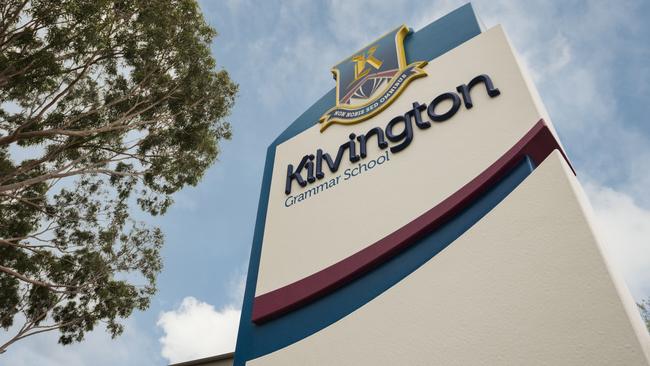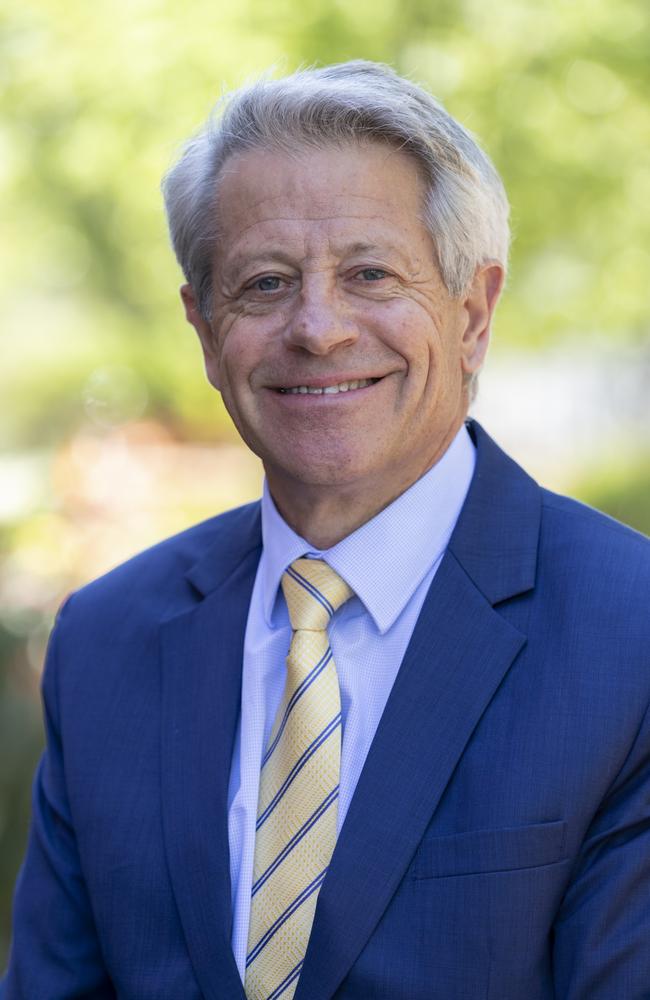Kilvington Grammar School principal Jon Charlton opens up on COVID lockdown life
As Victorian Year 12s return to school, a top Melbourne principal warns against focusing too much on ATAR scores, saying students’ “soft skills” are more important, especially in the face of a pandemic.

Inner South
Don't miss out on the headlines from Inner South . Followed categories will be added to My News.
Leading a school is a tough job any day of the week.
But throw in a global pandemic and strict lockdown laws and it could easily become a nightmare.
We sat down (virtually) with Kilvington Grammar principal Jon Charlton to discuss everything from what books he’s been reading in isolation, how remote learning practices have changed the education industry and even whether or not he still puts on a suit in the morning to work from home.
Here’s what he had to say:

What have been the challenges of remote learning and remote leading?
The greatest challenge has been the need to continually review all school operations (curriculum, pedagogy, assessment, co-curriculum, pastoral, administration, marketing, finances) and then swiftly implement changes, many of them significant.
Ongoing, regular communication with all stakeholders has been vital. Many decisions have had to be made on the run, amid conflicting advice from federal and state governments.
While, perhaps oddly, much of this work has been stimulating, it has been unrelenting.
Other challenges include ensuring the wellbeing of all students.
Wellbeing is critical to good learning. Some students have thrived in the online environment, others not. Our mentor system of one mentor to about 10 students has proven to be invaluable, as it is a manageable number of students to check in on daily.
Teacher workload has been another challenge. Remote learning has required much rethinking and rewriting of the curriculum and pedagogy for effective delivery and learning.
Also, endeavouring to deliver a quality remote learning program to our ELC (three and four-year-olds) and Prep to Year 2 students, conscious of the reliance on and need for considerable parent involvement
Dealing with student, teacher and parent fears and anxieties about students returning to school for essential assessments, like SACs, or returning to school full stop when restrictions have been eased is another challenge, as is ensuring staff morale remains high.
It has been critical to look after all staff, particularly those in the vulnerable category, so that they remain at the top of their game, and remain a source of strength and hope for students.
Dealing with the isolation. The sense of family and community run deep at Kilvington. Schools are soulless places without their students. Student noise is wonderful. As an example, conducting remote school assemblies, where there has been no audience participation, has made it a hollow rather than a vibrant experience.
Dealing with one’s own fears and anxieties with COVID — wife working in a hospital, son in New York, daughter giving birth to first child, potential COVID breakout in school (fortunately had none), parents losing their jobs — yet needing to stay positive and upbeat for the sake of others.
What have been the positives?
The education system needs to undergo a major shift in focus to take into account the rapid and ongoing changes in technology and the workforce, to better prepare students with the skills, competencies and attributes required for this future.
The remote learning experience will ultimately help shape new and flexible learning models to better support the learning needs of all students and help train them in the skills they need to navigate the 21st century.
Out of the bad, which is COVID, will come the good — a hybrid model of education that combines the best of onsite and remote learning practices for the betterment of students and their learning.
There will be increased levels of student self-regulation and collaboration, increased levels of staff collaboration, with far less absences.
More parents have developed a greater respect for teachers and the craft of teaching, as a result of sharing the room with their child’s class and/or needing to provide learning support to their child.
There will be less school meetings, particularly at night. Meetings have become shorter to the benefit of all.
In challenging times, you find out what you are really made of — as an individual and collectively. The strength of our community values has come to the fore. We have lived out our values of respect, trust, celebration of difference, creativity and excellence.
Our School motto, ‘Non nobis sed omnibus – Not for our own but others’ good’ — has taken on a new level of relevance. With COVID, and the very real concern for the vulnerable, the need to social distance for the sake of others has added new meaning.
What have you learnt about the students, staff and education in general during this time?
The human spirit rises to a challenge. A setback gives way to a comeback.
I’ve marvelled at the level of adaptability, flexibility and resourcefulness in students, staff and parents.
While the challenges have been huge, the community has stepped up, dug deep and given more, so that a quality learning and wellbeing program could continue. Despite an incredibly challenging year, our Year 12s have been agile, accepting, committed, resilient and coped exceedingly well.
Our education system has been remarkably agile and innovative too.
You have previously suggested the ATAR should be overhauled to include a broader measure of students’ abilities and intelligence. Has the global pandemic and remote learning changed or affirmed your views on this?
Views affirmed. In the face of a pandemic, when you are fighting the health crisis of your lifetime, priorities change and what really matters crystallises.
While we do still need a measure of a student’s academic ability, when you are experiencing an existential threat, what is more important are peoples’ capabilities, competencies, attitudes and strength of character.
If our focus remains too much on the ATAR, at the expense of the soft skills required in a rapidly changing technological world, we will be left behind.
How have you kept students and staff engaged during this tough and unprecedented year?
We have held ‘character and connection’ days for students to help build engagement and relationships. Lots of fun activities have been run by mentors, and our vast co-curricular program, while revised, has continued in some form.
A series of remote physical, art, writing, languages and cooking challenges have been run to keep our students and community inspired and engaged.
Staff have engaged with various fun activities run by our Staff Association. Regular staff briefings have been important, where we have celebrated our successes and recognised a staff member of the week.
Parents, with the support of our active PFA and Class Social Representatives, have also kept up with each other through a number of online events and celebrations; Mother’s Day and Father’s Day did not pass unnoticed.
Is there anything the school has implemented this year that is likely to become the
‘new normal’ for some subjects or occasions?
We will review the timetable, which is currently restrictive with its 8.30am-3.35pm times, with a view to possibly extending one day a week by placing a remote class for senior students late in the day, freeing up time in the middle of the day for other purposes.
We will also look at offering remote classes to students who can’t attend due to reasons such as hospitalisation and being overseas.
Remote parent/teacher/student interviews were a huge hit; less intrusive on family time. The only negative was the loss of informal interactions with others that occurs when held at school and which builds community. Remote Board and PFA meetings worked well but had the same downside.
What have you been reading during the lockdown period?
I needed to get away from heavy reading so picked up the novel “The Dry” by Jane Harper.
A classic ‘who dunnit’, and a brilliant read, but the ending unnerved me — the Principal of the school was the one who committed the murders! — So I went back to more serious reads, such as Harari’s trilogy on the history, present and future of mankind.
Also I enjoy doing crosswords.
What shows have you binged watched? Any recommendations?
Loved the footy being back on TV, watching the Tour de France and various documentaries.
Enjoyed a number of YouTube clips, especially ones showing pilots in the cockpit landing at various airports around the world.
Have you taken up any new hobbies?
Spent more time in the garden, which I have always found therapeutic. Regular exercise has been key. I’ve attended my normal gym class, remotely, three to four times a week and walked around my local park endlessly — I know every tree.
Have you still been putting a suit and tie on to work from home or opted for more casual attire?
A bit of both, depending on the remote audience or occasion. Ironing business shirts has definitely reduced.
What are you most looking forward to doing once restrictions are eased?
Going to the Mornington Peninsula to visit my daughter, son-in-law and first grandchild. It’s been a very tough time for first time mums; can’t wait to help out.
Pulling faces on your iPhone trying to get a smile from your grandchild doesn’t quite cut it.
MORE LEADER NEWS:
SCOUTS VICTORIA HIT BY MASSIVE DATA BREACH
